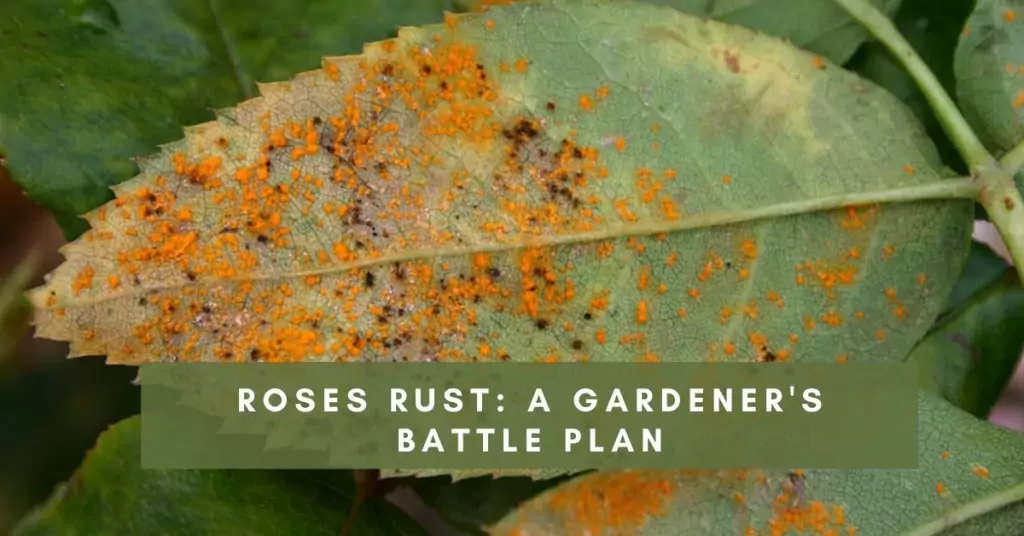Ah, the joys of gardening, where every bloom tells a story and every leaf hides a mystery. Picture this: your beautiful roses, the pride and joy of your garden, suddenly marred by the appearance of sinister dark brown-orange spots. Alas, it’s the notorious rust on roses, striking fear into the hearts of gardeners everywhere.
But fear not, fellow green thumbs! Together, we shall unveil the secrets of this nefarious foe and discover the ancient art of rose rust combat.
What does rose rust mean?
Rust on roses – a familiar yet perilous occurrence. This insidious invader spreads swiftly, casting a shadow on the beauty of your garden. When dark brown-orange spots grace the leaves of your rose, it’s a telltale sign – rust has taken hold. The culprit? A fungus of the Phragmidium genus. Its presence becomes evident in the early days of summer. This fungus, Phragmidium disciflorum, is a ruthless parasite, especially fond of delicate plants.
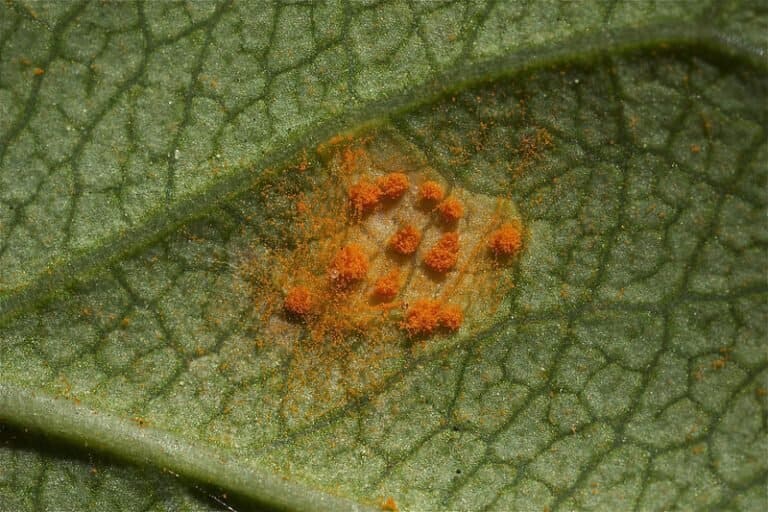
To combat this menace is a challenging feat. The plant’s stems crack once the infection ends, leading to its eventual demise. Phragmidium fungus can infiltrate your garden through new planting material or hitch a ride on other plants. High humidity provides the ideal breeding ground for this destructive force.
Under the influence of this fungus, the rose suffers immensely. Photosynthesis falters, essential nutrients are siphoned away, and the flower struggles to produce sufficient chlorophyll. A rust-afflicted rose might not survive the winter, succumbing to the harsh cold due to weakened defenses.
Understanding the Biology:
Rose rust, akin to other rusts, operates as a biotroph. It infiltrates the host tissues, residing for extended periods without causing immediate harm, sustaining itself from living cells. Unlike many pathogens, rusts cannot feed on dead plant material. To survive dormant seasons, they must either switch to a different perennial host or produce a resting spore, ensuring their resilience even during dormancy periods.
Understanding this biological intricacy is vital in crafting effective strategies for long-term rust management.
The Battle Strategies: How to Cure and Prevent Rose Rust
Early Detection and Regular Check-ups:
Just like an annual doctor’s visit, roses need regular check-ups. At the first sign of those rust, powdery patches, it’s time to spring into action. Remember, a watched rose never rusts!
Hydration and Nutrition:
Proper watering and nourishment boost your rose’s immune system. Water them well, especially in the growing season, and indulge them with a balanced nitrogen, magnesium, and potassium diet.
Defensive Maneuvers:
In the battle against rust, a strong defense is critical. Regular fungicide treatments, especially copper-based ones, are your trusty shields. Please remember that moderation is the key.
The Great Pruning Ritual:
In spring, trim away the infected branches and leaves. Be ruthless! Dispose of these tainted parts far from your garden, ensuring the rust spores never reoccur.
What is a homemade remedy for rust on roses?
In the battle against rose rust, homemade remedies stand as nature’s shield, fortifying the immunity of your roses. Combining the power of chemistry with natural ingredients provides a potent arsenal against this persistent invader.
Nettle Infusion:
Prepare a robust nettle infusion by filling a bucket with fresh nettle leaves and pouring warm rainwater. Let the concoction bask in the sunlight for 14 days. Dilute the injection with water at a ratio 1:9 for watering and 1:19 for spraying your rose bushes.
Wormwood Tincture:
In a container, combine 500 grams of wormwood with rainwater. Let this mixture soak up the sun for a fortnight. Afterward, spray your rose bushes, blending the tincture with water at a 1:9 ratio.
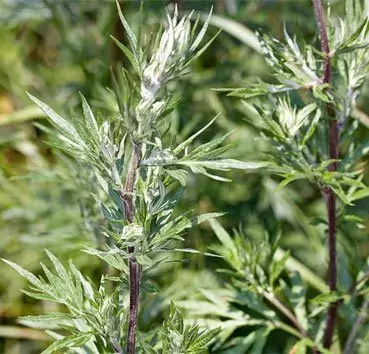
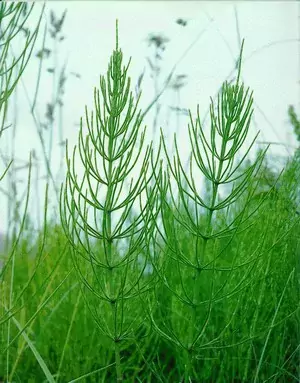
Soapy Solution:
Craft a soapy solution using plain household soap devoid of dyes and fragrances. Grind two pieces of soap and dissolve them in hot water. Once cooled, spray your plants 3-4 times a week with this solution.
Horsetail Decoction:
Create a decoction by steeping one kilogram of chopped horsetail greenery in 10 liters of water daily. Boil the infusion for 30 minutes, dilute it at a 1:10 ratio with water, and use it to spray your rose bushes.
A Touch of Chemistry (if necessary):
If all else fails, our modern saviors come in the form of tebuconazole-based fungicides. These marvels of chemistry swiftly put an end to rust’s nefarious plans, allowing your roses to bloom in peace.
In the battle against rose rust, specific fungicides have been designed to tackle this stubborn foe. Tebuconazole, found in products like BioAdvanced Disease Control for Roses (Active Ingredients: 0.15% Imidacloprid; 0.80% Tebuconazole), and tebuconazole combined with trifloxystrobin, as seen in Provanto Fungus Fighter Plus and Toprose Fungus Control & Protect, prove effective in rust management. Triticonazole, present in Ortho Rose & Flower Disease Control Concentrate, is another potent weapon against this disease.
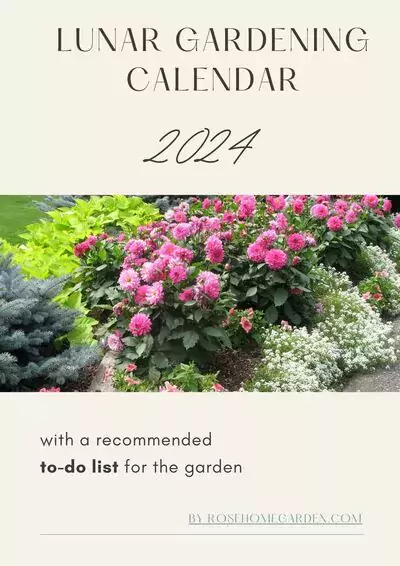
Get Your Free Lunar Gardener's Calendar 2024!
Join the Lunar Gardening Revolution! Subscribe now to receive our exclusive Free Lunar Gardener’s Calendar for 2024. Harness the power of the moon to optimize your planting, nurturing, and harvesting.
How do you prevent rust on plants?
- Remember, prevention of disease is always better than long-term treatment.
- When you purchase new plants for the garden, please look over them for signs of disease. To avoid introducing various infections into the park, placing new plants separately from other plants for a week before transplanting them and giving them a prophylactic treatment before planting is best.
- Select Resistant Varieties: Choose rose varieties naturally resistant to rust, reducing the risk of infection.
- Proper Spacing: Plant roses with adequate spacing between them to ensure good air circulation, preventing the buildup of moisture that aids rust growth.
- Sunlight Exposure: Plant roses in sufficient sunlight; sunlight helps dry the leaves and inhibit rust development.
- Well-Drained Soil: Plant roses in well-drained soil to prevent waterlogging, creating a conducive environment for rust spores.
Avoid Overhead Watering: Water the roses at the base to keep the foliage dry, minimizing the chance of rust spores finding a damp surface to settle on.
- Regular Pruning: Prune roses to remove overcrowded or diseased branches, promoting better air circulation and reducing the risk of rust.
- Clean Debris: Remove fallen leaves and other plant debris regularly to eliminate potential sources of infection.
- Proper Fertilization: Maintain a balanced fertilizer regimen; overly nitrogen-rich fertilizers can promote lush growth, making plants more susceptible to rust.
- Natural Fungicides: Apply fungicides like neem oil or copper-based solutions preventatively to boost plant immunity.
- Please monitor regularly: Keep a close eye on your roses for any signs of rust infection; catching it early helps for quick intervention and prevents its spread.
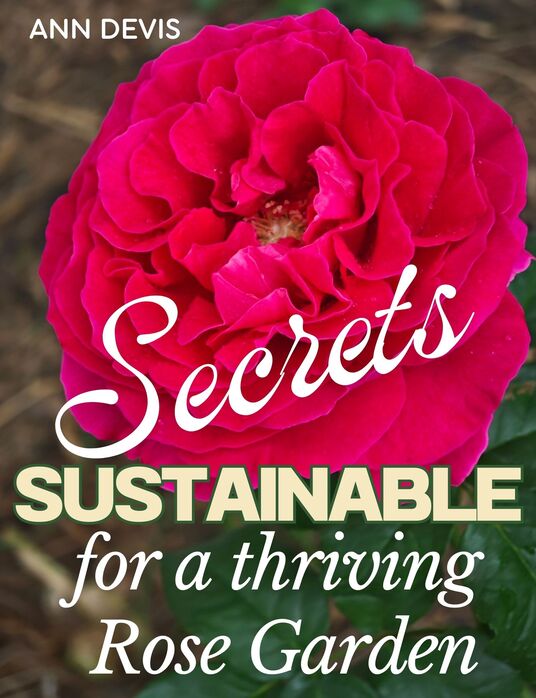
The Organic Rose Revolution: Grow Stunning Blooms, Naturally
- Unlock the secrets of nurturing your roses organically with our guidance on soil health, natural fertilizers, and sustainable pest control methods. Your garden will thrive with eco-friendly care that respects nature’s balance.
- Empower yourself with the knowledge to craft natural remedies for common rose ailments.
- Banish pests from your garden precisely using proven strategies that safeguard your roses without harsh chemicals. Keep aphids, mites, and other invaders at bay while preserving your garden’s natural harmony.
- Explore a world of breathtaking rose varieties carefully curated to captivate your senses and elevate your garden to new heights of beauty.
Ultimately, the battle against rust is one of vigilance, care, and herbal wisdom. With your newfound knowledge, let your roses thrive, their petals vibrant and rust-free. So go forth, dear gardener, armed with your pruners, fungicides, and herbal magic. May your roses bloom abundantly and your garden be forever rust-free!

